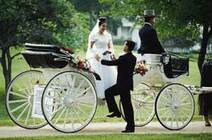
Even our popular songs perpetuate the ideal vision of a happy love-marriage, so it’s easy to forget, in today’s world, that marrying for love is a relatively new concept … and maybe not such a good one at that.
What? Hold on. Let’s take a look at history.
Photo source: www.justwinecountry.com/
For most of the history of civilization marrying for love has not been the modus operandi. It is not that love didn’t exist, for surely it did. We have too many myths, legends, songs, and cultural traditions to confirm humans have felt love in all its various forms, including romantic love and sexual attraction, way way back in our evolution. But love was not the primary reason for marrying someone anywhere in the world before the late 1700s.
Although the Roman poet, Virgil (70 bce – 19 bce) wrote in his pastoral poem the Eclogues, “Amor vincit omnia, et nos cedamus amori. - Love conquers all things, so we too shall yield to love,” he also wrote about other things, including work, conquering all [although not in the same poem], and he never suggested it was the best reason for marriage.There have even been times and cultures where love was viewed as a disadvantage to a marriage.
Stephanie Coontz tells us in her 2005 book [Marriage, A History: From Obedience to Intimacy, or How Love Conquered Marriage], that the ancient Greeks considered love a form of insanity. In India falling in love before marriage was considered disruptive and a danger to society. In China too much love between a husband and wife was treated as a threat to the extended family. She writes,
“Only rarely in history has love been seen as the main reason for getting married. When someone did advocate
such a strange belief, it was no laughing matter. Instead it was considered a serious threat to social order.” …
“Through most of human history, love was not at all the point of marriage. Marriage was about getting families
together, which was why there were so many controls.” https://www.thesunmagazine.org/issues/489/the-radical-idea-of-marrying-for-love
Despite of Virgil’s profound insight into love, the ancient attitudes regarding marriage continued through the middle ages. Up until the late 1700s, the concept of marrying for love would have been received by most people in the world as outrageous as the idea of same-sex marriage was perceived in the 20th century. Until that time, marriage was necessary for survival, reproduction, and social acceptance.
The radical idea of marriage for love sprang up and began to take hold in the late 18th and early 19th centuries, in part because the Industrial Revolution allowed people to move away from farming – reducing the need for large families to work the land – and in part by the Enlightenment thinkers of the time, who challenged the monarchs and embraced the issues of human rights. The growth of capitalism led to growth in wealth and in the middle class, leading to more freedom of choice and the elevating the status of women [a little but certainly not to equality -- that, in my opinion, is yet to come].
The Enlightenment’s rhetoric about the “right to personal happiness” may have proved to be sophistry. In the 21st century marriage and love are often depicted, together or apart, as being a state other than personal happiness.
https://www.thesunmagazine.org/issues/489/the-radical-idea-of-marrying-for-love
Good luck with that!
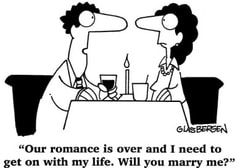
In most cultures throughout history and throughout the world, marriages have been arranged, usually by parents but not always. In places where the arranged marriage tradition dates back to ancient times, the pact resulted in the merger of the two families.
Such a fusion carried with it broad ramifications relating to money and/or politics, which include power, influence, political authority, security, allies, social prestige, progeny, inheritance, and privilege. Choices were carefully
Cartoon by Glasbergen calculated to advantage both families.
Photo source:https://funnytimes.com/19980624
Nonetheless, in most societies, including those with arranged marriages, the relationship with the greatest importance was that of the birth family. A person’s loyalty and emotional connection was owed to blood ties rather than to marriage. An individual could always find another spouse, but could never replace a member of the birth family. That belief alone made the choice of marriage partner for a son or daughter even more important.
Most of us are aware of the idea of marriage for other purposes than love in relation to the upper class elite, aristocracy, and nobility, but it was also true among the middle and lower classes as well. Every family tried to marry their daughters into a family with more money and more power, because that not only provided for the daughter but increased the value of, and often provided for, her birth family in a variety of different ways.
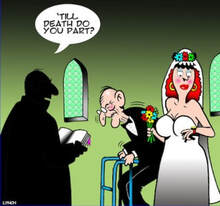
Nowadays, society tends to look down on the practice of marrying for money [which is equivalent to marrying for power], but that was one of the primary reasons for marriage until a few hundred years ago.
The Dowry
The dowry is the transfer of property or money from the bride’s family to the groom or to his family. Its purpose was to help the newly-wed couple establish a new household and also a form of protection for the bride against ill treatment by the husband or his family. Where this is the tradition, it is actually a conditional gift which should be restored to the wife and her family if the Cartoon by Mark Lynch - Photo source: husband abuses or divorces her. The husband can profit by it during the
The Daily Toon www.humortimes.com/ marriage, but the dowry would have to be returned in the case of mistreatment
or divorce. My research found conflicting opinions regarding who controlled the
money or property during the marriage. cartoon by: Chris Wildt Source: Pinterest▼
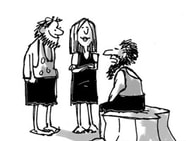
“I can’t offer you a dowry, but I an get you on my health plan.”
The Dower
A dower means a wife’s rights to her husband’s real property or wealth after his death. Her inheritance.
The Bride Price
The bride price [also called bride service or bride wealth] is a payment from the groom or his family to the bride’s parents. According to the Encyclopedia Britannica, the bride price was less an economic gesture but served to consolidate the friendship between the two families. Whatever property belonging to the bride at the time of marriage remained her property under her control. The tradition of dowry and the expectations varied from one society and century to another.
Cartoon by George Jartos
Source: Pinterest
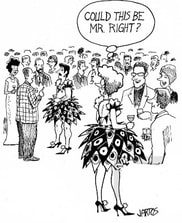
Most people who aspire to marriage hope for the perfect match … hope to be the perfect couple. Soulmates.
American writer Richard Bach writes, “A soulmate is someone who has locks that fit our keys, and keys to fit our locks. When we feel safe enough to open the locks, our truest selves step out and we can be completely and honestly who we are."
Psychologist and relationship expert Dr. Carmen Harra writes, “Your soulmate makes you feel entirely whole, healed and intact, like no piece is missing from the puzzle. A life partner, on the other hand, can be a great supporter and long-time companion, but is limited in his or her capacity to enrich your spirit. Most of us remain in life-partner relationships because we "settle," for a multitude of reasons."
Personally, I don’t believe the perfect couple exists or that there is only one person in the world who could be your soulmate. No relationship is perfect and a good marriage [or a perfect couple] is something that doesn’t “just happen.” Both parties have to work at it on an ongoing basis. I do accept the notion that in a love marriage, particularly with a soulmate, it may be easier to learn to live with, and love, the imperfections of your mate.
I agree with Barsha Nag Bhowmick, editor for Indiatimes.com, that “perfect couples” couples are really “imperfect couples” who have learned to enjoy their differences … regardless of whether it started out as a love marriage or an arranged marriage.
Cartoon by Glasbergen - Photo source:https://funnytimes.com/1998062

Surveys show that the number one place that singles meet in America is online. How is that so different from an arranged marriage? In the 21st century, even in an arranged marriage, the parties in question have to agree and accept the arrangement [according to what I read and have been told]. So, as I see it, the major difference occurs in the first part of the process: i.e. the screening of
“I said I’m looking for a date who potential mates and introducing the best matches.
is soft, sweet, and a little bit nutty.
They matched me with a loaf of banana bread.”
Instead of trolling for a possible catch in bars or other singles venues, or the dreaded blind-date, and using the dating process as the screening, which can be tedious, disappointing, and sometimes even dangerous, both approaches let someone else narrow down the field for you. With that accomplished, it is then up to the couples to decide whether or not they are interested. In the case of arranged marriages, it is either the parents or a matchmaker doing the vetting. It can go as far as hiring a private detective to find out what the potential spouses have been up to, which is more intense than dating services matches.
The online companies use the information you give them to screen and match. In those questionnaires, most people don't list their traffic tickets, outstanding warrants or arrests, mountains of debt, having had 6 spouses already, etc.
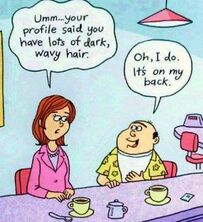
A spokesperson for "Relationships On Your Terms" says the main difference between matches made on this platform and in the real world is that “people are up front about their expectations."
Cartoon by: unsigned - Photo Source:https://www.pinterest.com/pin/501095896031944042/?lp=true
Surveys indicate that meeting online could be the reason for the increase in interracial partnerships and more connections with people considerably outside our usual social circles.www.technologyreview.com/online-dating-changing-society
That being said, other surveys show that more than a third of marriages start online. Couples meeting online statistically marry sooner (knowing each other for less time) and new research suggests that couples who meet online are also more likely to divorce.
Still, meeting online is the 21st century update to arranged marriages.
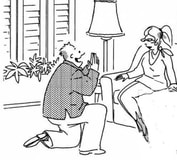
The issue is one of honesty, and that is a major factor no matter how the couple meets.
“I just realized this is the position I use for shooting dice.”
Cartoon by Ray Delgado - Photo source: Pinterest
Sources:
https://us.sagepub.com/sites/default/files/upm-binaries/41374_1.pdf
https://www.professorshouse.com/arranged-marriage-facts/
https://www.thesunmagazine.org/issues/489/the-radical-idea-of-marrying-for-love
https://www.indiatoday.in/lifestyle/relationship/story/indians-swear-by-arranged-marriages-155274-2013-03-04
https://www.cnn.com/2018/03/21/world/arranged-marriage-christiane-amanpour-sex-love-around-world-delhi/index.html
https://thriveglobal.com/stories/the-history-of-marriage-why-marrying-for-love-is-a-newer-idea-than-the-printing-press/
https://humans.media/is-marrying-for-love-a-modern-concept
https://www.psychologytoday.com/us/blog/contemplating-divorce/201311/3-reasons-why-you-shouldnt-marry-love-alone
https://www.huffpost.com/entry/love-marriage-history_n_4774740
https://www.pewresearch.org/fact-tank/2019/02/13/8-facts-about-love-and-marriage/
https://psychcentral.com/lib/5-reasons-not-to-marry-the-one-you-love/
https://www.cosmopolitanme.com/content/19014-marrying-wedding-love-advice
https://timesofindia.indiatimes.com/blogs/life-n-style/are-arranged-marriages-better-than-marrying-for-love/
https://www.psychologytoday.com/us/blog/the-science-love/201208/arranged-vs-love-based-marriages-in-the-us-how-different-are-they
http://nymag.com/nymetro/news/culture/features/11621/
https://en.wikipedia.org/wiki/Love_marriage
https://jamigold.com/2015/02/is-love-conquers-all-realistic/
https://www.pewresearch.org/fact-tank/2019/02/13/8-facts-about-love-and-marriage/
https://hunterbaker.wordpress.com/2014/11/19/opening-arguments-love-doesnt-conquer-all/
http://nymag.com/nymetro/news/culture/features/11621/
https://en.wikipedia.org/wiki/Arranged_marriage_in_the_Indian_subcontinent
http://iml.jou.ufl.edu/projects/spring07/Zuffoletti/theprocess.html
https://www.washingtonpost.com/news/soloish/wp/2016/02/15/is-online-dating-the-same-as-arranged-marriage-ravi-patel-thinks-so/
https://www.twoque.com/would-you-choose-love-or-money/
https://aminoapps.com/c/my-hero-academia/page/blog/the-perfect-couple-doesnt-exis/P655_NlCmukWQRelRYGgpJKjGW5NKWgLQ
https://www.huffpost.com/entry/elements-of-a-soulmate_b_3595992
https://www.nytimes.com/2018/04/11/style/match-shaadi-league-farmersonly-dating-apps.html
“History: How Love Conquered Marriage” by Stephanie Coontz



 RSS Feed
RSS Feed